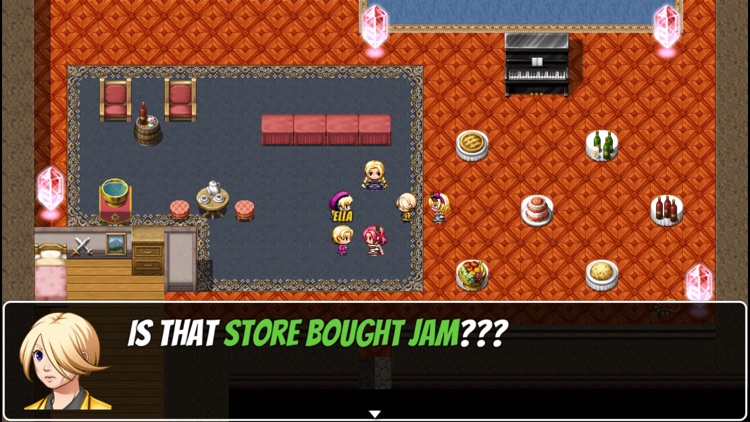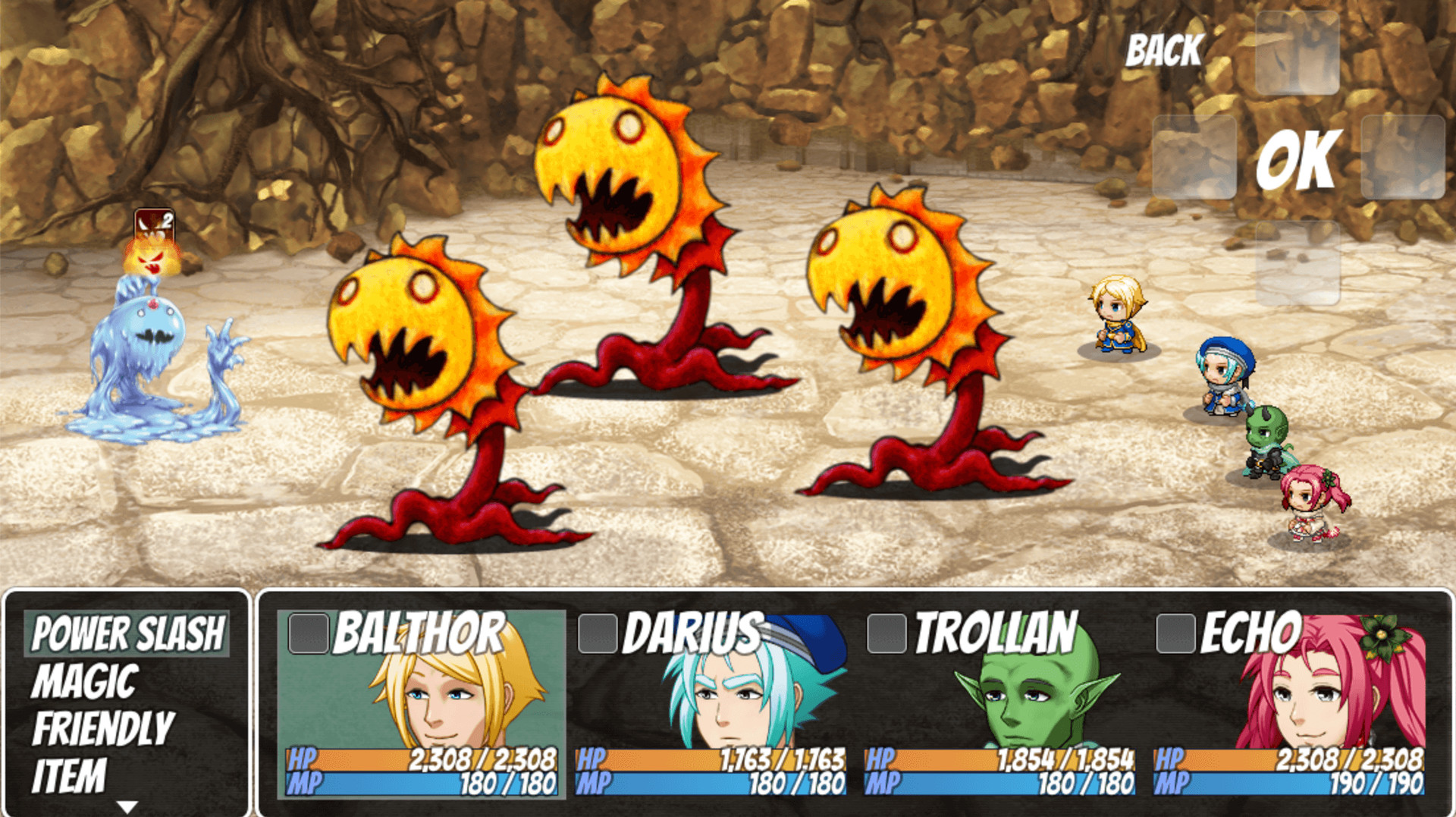Search
[{{{type}}}] {{{reason}}}
{{/data.error.root_cause}}{{{_source.title}}} {{#_source.showPrice}} {{{_source.displayPrice}}} {{/_source.showPrice}}
{{#_source.showLink}} {{/_source.showLink}} {{#_source.showDate}}{{{_source.displayDate}}}
{{/_source.showDate}}{{{_source.description}}}
{{#_source.additionalInfo}}{{#_source.additionalFields}} {{#title}} {{{label}}}: {{{title}}} {{/title}} {{/_source.additionalFields}}
{{/_source.additionalInfo}}Crisis of the Middle Ages (PC)

Crisis of the Middle Ages
Developer: OrgAction LLC
Platform: Windows, Mac OS X
Released: May 29, 2019
Genre: RPG
ESRB Rating: Teen
Players: Single-Player
Current Price: $1.99
Before the ill-fated collaboration that gave rise to the first PlayStation, there were the JRPG's of the early 90s. Final Fantasy IV... Chrono Trigger... Final Fantasy VI... these are Da Vinci's Mona Lisa, or Van Gogh's Starry Night. Crisis of the Middle Ages is a Fu Manchu Sharpie'd by a drunk tourist on the Mona Lisa--and it just works. This is a game that's smart enough to not take itself seriously, and that in my opinion, is its saving grace.
In order to understand what Crisis of the Middle Ages is, you have to know beyond a shadow of a doubt what it's not. It's not a serious game by any stretch of the imagination. It's not long, difficult, or complicated. As long as you never run away from a fight, you're guaranteed to level up your party into ridiculously overpowered tanks long before you finish the game. The world is small, the dungeons are not overly complicated, and the game is so quest-driven, it might as well be on rails. And the story, well... we'll get to that soon enough, but don't let that discourage you.
The controls are quite intuitive, even for a salty old SNES dog like myself, which I think is part of what makes it so addictive. Anyone who's ever played classic JRPG's will have no trouble with a controller, but keyboard/mouse users will want to remap their controls immediately. Since it appears to be built from the RPGMaker engine, the Indie-nature of the game is rather obvious, but that also makes it quite stable. My only glitch was a chest which disappeared after I removed its contents. The menu system, both in and out of battle takes a page directly from the old Squaresoft games of the early-to-mid 90s, which will have most feeling right at home, but it's the status-changing items which really steal the show. Anything from mallets to instruments to dresses and even cans of beans can be given to monsters in battle, with hilarious results. As if that weren't enough, the monsters can bicker among themselves at the start of a battle, and often fourth wall break by changing both music and background of a fight. This alone relieves the tedium of grinding, but their dialogue and reactions to your party ensures boredom never becomes a problem.

Strong Points: Intuitive controls; great music; hilarious use of items and dialogue
Weak Points: Weak storyline; scattered plots; spotty character development at best
Moral Warnings: Even demonic monsters portrayed as almost good; implied beastality; blatant pseudo-moral hammering that evil does not exist
As for the story, well... abandon all hope, all ye who enter here. At best this bastion of loveliness that is supposed to be the meat and potatoes of any good RPG is little more than cheap, stale cheese curls from a vending machine. At worst, our virtue-signaling virtuosos employ a sledgehammer graffitied with the words "evil does not exist" in their desperate attempt at serving cerebral pudding on the half-skull.
The two main characters, Echo and Balthor, appear to have well-developed backstories and character arcs, which are actually portrayed quite well in the beginning of the game. Echo, the female protagonist, is the first to be introduced, and is quite relatable, not to mention fun to play through the first dungeon. Balthor however is a cringy parody of an effeminate man-child who is ostensibly the Captain of the Guard. This job is short- lived however when he's promptly fired upon inviting Prince Alden to - and I wish I were kidding - smell the roses. He is backed by Darius, an extremely gifted mage, and a troll named Trollan immediately thereafter. After a few dungeons, the trio finally link up with Echo and the real adventure actually begins.
About a third of the way through however, the real travesty couldn't help but reveal itself when all hope for the plot - starting with Darius' character development - deflated faster than inflatable sheep in a frat party brawl. Don't think it's only limited to him though, because by the midpoint, the only character left standing in this literary dumpster fire is Echo. She's the straight man - or woman - in the bad comedy that is the constant pursuit of Balthor - the fresh meat - ahem - object of affection for dozens of female NPC's. This ill-conceived explosion of flaming manure - I mean stunningly brave reversal of sexist memes - is just one of many screamingly obvious tropes from which we find no escape. While admittedly hilarious at first, it quickly grows so tiresome, the real comedy of using items on monsters quickly became necessary mitigation for the ever-growing threat to sanity that is laughably called the storyline behind Crisis of the Middle Ages.

Higher is better
(10/10 is perfect)
Game Score - 88%
Game Play: 15/20
Graphics: 6/10
Sound: 10/10
Stability: 9/10
Controls/Interface: 4/5
Morality Score - 59%
Violence – 7/10
Language - 6.5/10
Sexual Content – 7/10
Occult/Supernatural - 5/10
Cultural/Moral/Ethical - 4/10
As I continued my masochististic toils, now in the name of reviewing the game, I found myself clinging with increasing desperation to the comedy and nearly mindlessly intuitive gameplay. New plot holes engulfed all hope of ever enjoying my continued existence while existing ones grew wide enough to parallel park aircraft carriers until at last, I reached the final dungeon.
And so, fortified with Amaretto to deaden the pain, I trudged onward, only to have it dawn on me that the light at the end of the tunnel was actually - surprise! - yet another freight train. It was not enough for said virtuosos to turn my brain into pudding with a plot that should be banned as a form of torture under the Geneva Convention. They present like a mandrill here. It's revealed immediately before the final boss that - spoiler alert! - the mother of one of the party members is a Cerebus disguised as a human because... inclusivity! No buildup, subtle foreshadowing, just "you're half human," says the three-headed dog.
After beating the game and being rewarded with what could arguably be the worst ending I've ever seen, I found myself strangely conflicted about it. I wanted to absolutely loathe Crisis of the Middle Ages, but somehow I couldn't bring myself to. I puzzled over it for hours, either in front of my computer, or chain smoking outside, until it finally hit me. It was never meant to be taken seriously. As I implied in the beginning of the review, it's a throwback to the dawn of RPG's - not the ones we're used to, but rather the very first text-based ones. Zork and Dungeons of the Gods come to mind. Those games were also on rails, no character development, and no backstory. They took modern references, such an inflatable life raft, and even pop culture references and integrated them into the story in unexpected ways which kept the player coming back for more. Like these titles of yore, Crisis of the Middle Ages needed no real plot, so its creators didn't bother wasting their time. Instead, they invested their efforts wisely by turning classic RPG and pop culture tropes on their head to create an experience that was both hilarious and cathartic, even if they couldn't help but inject their own beliefs and philosophies into it. When viewed from this perspective, my mistake was embarrassingly obvious: I treated it as if it were a modern RPG.
That said, the game's fundamental moral flaws are as simple as they are glaring. While there is no blatant sexual innuendo or foul language, monsters, even demonic ones are portrayed as somehow friendly, the endless stream of flaming nymphos and cougars hungering for Balthor at every turn, the mother of one of the Four Heroes being a three-headed dog in disguise, and the false morality that evil doesn't exist makes for a fatiguing experience to say the least. Unsupervised, young children left to play it may be lulled into a false sense of security, which could cost them dearly if they were to accept an invitation from the next harmless-looking yellow Volkswagen. Despite its almost childlike nature, it's probably best left to teen and adult audiences.






